Sarah Wendell and Candy Tan appeared on The Bat Segundo Show #296.
Sarah Wendell and Candy Tan are most recently the authors of Beyond Heaving Bosoms. They are also the proprietors of Smart Bitches, Trashy Books.
Subjects Discussed; Kathleen Woodwiss’s The Flame and the Flower, the beginnings of original paperback romance, genre respectability, romance’s profitability, the stigma of effeminacy, cozy mysteries, arterial bloodspray, the fallacious anatomical placement of the hymen, spontaneously lactating virgins, whether the pun is intended or not, editorial house style and “the magic hoo hoo,” the wandering vagina, Lilith Saintcrow’s “Half of Humanity is Worth Less Than a Chair,” rapists within romances, Candy Tan’s suggestive hand gestures, marriage and choice, intrusive Mercedes drivers and related invective, the frequency of oral sex within romances, how far sex needs to go in art, porn, anal sex, bukkake, double wangs and double penetration, homunculi, the line between romance and erotica, hypothetical genre fusion, poseur man titty and erotic romance, the “shop and run” approach to romances, embarrassing covers, dashing long-haired heroes and bald badasses, game theory and Sarah and Candy’s reading preferences, Candy’s pirate fixation, the sharp disparity between genuine smelly pirates and the twee McSweeney’s pirates, “the big mis,” John O’Hara’s Appointment in Samarra, misunderstandings and character flaws, simultaneous organs, romances and Republican presidencies, Cassie Edwards and plagiarism, and encouraging civil disagreement and discourse in the romance community.
EXCERPT FROM SHOW:
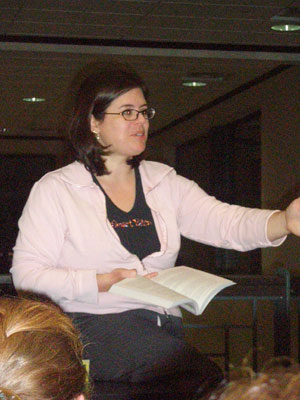 Correspondent: Science fiction, mystery, YA. These genres are getting respect, particularly in the last decade. And yet romance is still one of those things in which people thumb their noses down. Why do you think this is? Must we always have some place to go for the ghetto? What’s the deal here?
Correspondent: Science fiction, mystery, YA. These genres are getting respect, particularly in the last decade. And yet romance is still one of those things in which people thumb their noses down. Why do you think this is? Must we always have some place to go for the ghetto? What’s the deal here?
Sarah Wendell: Well, I will point out that romance is actually getting a lot more respect because of the turgid strength of its quarterly earnings. And even though most industries — especially in New York, which is hyper-navel gazing in the financial industry — are experiencing massive losses year to year and quarterly to quarterly, romance is the one erect column in your spreadsheet. And it remains quite strong. So while it doesn’t get a lot of respect from your average cocktail crowd, most financial newspapers are having to pay attention to the strength of romance when you’re looking at it as an investment, or as an indicator of an economy. Which is why I think that Harlequin is chuckling, or befuddled, at the entire economic crisis. Because they were founded during the Depression. I’m sure they’re looking at this, going, “This? This is nothing. Are you kidding? Let me just tell you what it was really like.”
Candy Tan: This is great for business!
Sarah Wendell: I know.
Candy Tan: What the hell? No, I think personally that a lot of the reason why romance novels are the Rodney Dangerfield of genre fiction is the stigma of effeminacy. You know, science fiction. They’re “novels of ideas.” Mysteries have lots of blood and guts. Well, some of them do. The ones that don’t get respect, interestingly enough, tend to be the cozy mysteries. The ones in which there’s a cat solving the goddam murder or whatever the hell. You know, those are the ones: “Oh man, they’re not worth taking seriously.” If I remember correctly, and I might be wrong, because I don’t know mystery as well as I should, the hardboiled mystery were one of the first to exit the ghetto.
Sarah Wendell: As long as there’s arterial bloodspray, you get some respect.
Candy Tan: Or you know…
Sarah Wendell: Spooge, not so much.
Candy Tan: Yeah, there’s definitely a lot more respect for male fantasies versus female fantasies in fiction and you see this over and over again.
Correspondent: If we’re going to talk about arterial bloodspray, I think we should point to the fallacious anatomical scenario involving hymens, which you point out in this book.
Sarah Wendell: At length. At great, great length.
Correspondent: Yeah, at great length.
 Sarah Wendell: You can tell that this is something that rubbed us the wrong way.
Sarah Wendell: You can tell that this is something that rubbed us the wrong way.
Correspondent: Yes, I got the sense…
Sarah Wendell: And to anyone who’s listening, I want a complete pun count at the end of the podcast. And if we can get an accurate pun number, I’ll totally give away a copy of the book and some beaucoup prize if you can identify how many puns we make in the course of this interview.
Correspondent: But the question is: You have so much attention to detail in historical romance and yet this one thing continues to propagate, continues, I suppose, to not be patched up in quite the way that one would expect.
Sarah Wendell: Good one.
Correspondent: And so what I’m wondering is: Do you think romance readers and romance writers want to fantasize about where the hymen is?
Sarah Wendell: No, I think it’s simple oral history. And I don’t mean that in a bad way. I think that the legend of the misplaced hymen is just something that’s passed down from writer to writer. Much like the historical inaccuracies that plague other parts of the specific historical genre, “Where the hell your hymen is?” is one of them.
Candy Tan: Here’s the thing. I think I’ve spotted the same misplacement of the hymen in other books. Not romance novels. I think I’ve read a couple of horror novels — and maybe it would have made sense if the girl being devirginized were some kind of filthy alien beast. By hymen, you mean vagina dentata. But you don’t. Oh, oh, it’s infected other genres too! How wonderful! Anatomical craziness all the way around.
Sarah Wendell: And that’s not the only anatomical inaccuracy we’ve discovered. There’s a few one off inaccuracies we’ve discovered that are just mind-boggling. Like there’s one Gaelen Foley where the heroine’s a bona-fide virgin. And I mean bona-fide. Not is she like a virgin, but she’s like a princess or some shit? They haven’t even had sex yet. This is the first time they’re kissing in the woods. And he tastes her milk. Because, you know, virgins spontaneously lactate. Like a postpartum woman going into Target and hearing a baby cry. Yeah, same thing.
Candy Tan: It was the most nipple-tacular moment in all historical romance.
BSS #296: Sarah Wendell and Candy Tan (Download MP3)




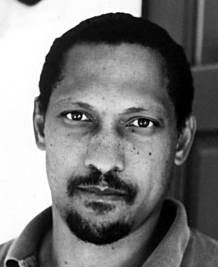 Correspondent: I recently read Richard Powers’s forthcoming novel, Generosity, which deals with the notion of what a novel really is and what ideas and characters really are. And I’m very curious to put this question to you. To what degree do you need reality to start from? And to what degree do you feel the need to be faithful to reality? Or even faithful to real-life figures? Or can you accept a Percival Everett figure in this who also happens to have a book called Erasure?
Correspondent: I recently read Richard Powers’s forthcoming novel, Generosity, which deals with the notion of what a novel really is and what ideas and characters really are. And I’m very curious to put this question to you. To what degree do you need reality to start from? And to what degree do you feel the need to be faithful to reality? Or even faithful to real-life figures? Or can you accept a Percival Everett figure in this who also happens to have a book called Erasure?

 Correspondent: I should probably start this conversation off by confessing something to you. I think that Rachael Ray is a bit on the crazy side. She’s not someone who really makes me comfortable. I’m actually quite frightened by her. You know, I don’t find her down-to-earth at all. And I think maybe we can start off by describing how we went from this relatively benign cooking show setup, in which you had a quieter, less frenetic impulse, to this more exhibitionistic cooking show that involves a Jerry Springer-like audience shouting for the EVOO and all that. How did we get from one extreme to the other? Do you have any fundamental observation throughout the course of your meticulous observations?
Correspondent: I should probably start this conversation off by confessing something to you. I think that Rachael Ray is a bit on the crazy side. She’s not someone who really makes me comfortable. I’m actually quite frightened by her. You know, I don’t find her down-to-earth at all. And I think maybe we can start off by describing how we went from this relatively benign cooking show setup, in which you had a quieter, less frenetic impulse, to this more exhibitionistic cooking show that involves a Jerry Springer-like audience shouting for the EVOO and all that. How did we get from one extreme to the other? Do you have any fundamental observation throughout the course of your meticulous observations?

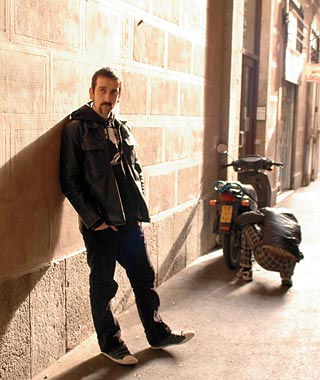 Correspondent: I must ask then, Mara Faye, if you had read any other books to get the idiom right in English for this. Because both your translation of this book [Wonderful World] and your translation of Pandora in the Congo strike me as far more specific. It’s almost as if the translation itself can be placed within a neat, genre-specific feel in the prose. And I’m curious if you do it more intuitively or if you actually do, in fact, try and read books surrounding a particular genre or a particular place it might end up. So that it might be more palatable to the English ear.
Correspondent: I must ask then, Mara Faye, if you had read any other books to get the idiom right in English for this. Because both your translation of this book [Wonderful World] and your translation of Pandora in the Congo strike me as far more specific. It’s almost as if the translation itself can be placed within a neat, genre-specific feel in the prose. And I’m curious if you do it more intuitively or if you actually do, in fact, try and read books surrounding a particular genre or a particular place it might end up. So that it might be more palatable to the English ear.

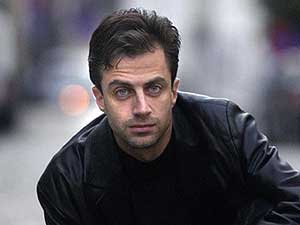 Correspondent: If we’re talking about time, there’s also the notion of reader’s time. And as a stylist, you have some control over how frequently or how long or how short the reader’s going to turn the page. When I read your book, I found numerous passages when I would slow down. And then when dialogue would bump up, particularly with the scenes with the cop, it then sped up.
Correspondent: If we’re talking about time, there’s also the notion of reader’s time. And as a stylist, you have some control over how frequently or how long or how short the reader’s going to turn the page. When I read your book, I found numerous passages when I would slow down. And then when dialogue would bump up, particularly with the scenes with the cop, it then sped up.

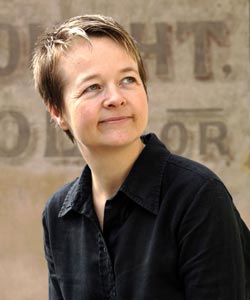 Waters: He’s about to turn forty.
Waters: He’s about to turn forty.

 Correspondent: You use the words — the modifier “seemingly liberated’ — to describe this educated Indian woman who goes and, of her own volition, says, “I want to have boys. I don’t want to have girls.” Let’s actually take this into consideration, along with the case of
Correspondent: You use the words — the modifier “seemingly liberated’ — to describe this educated Indian woman who goes and, of her own volition, says, “I want to have boys. I don’t want to have girls.” Let’s actually take this into consideration, along with the case of 

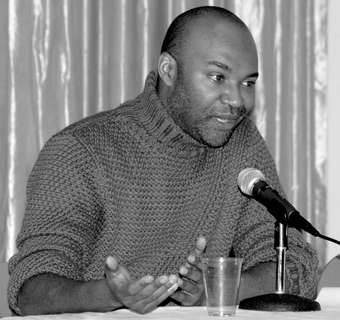 Correspondent: You write, “In my adult life, I’ve seen that while white institutions could be unthinking, even brutal, toward black aspirations, individual whites, either through genuine friendship or political philosophy, could be crucial allies. So while I never lost sight of racism, it became a huge part of my personal development to take whites as they came, not expecting racism or prejudice from them. And even if it was there, not to overreact, but remember it and exact revenge when I could.” But isn’t revenge along the lines of a kind of negative emotion? Or a negative idea like racism? I mean…
Correspondent: You write, “In my adult life, I’ve seen that while white institutions could be unthinking, even brutal, toward black aspirations, individual whites, either through genuine friendship or political philosophy, could be crucial allies. So while I never lost sight of racism, it became a huge part of my personal development to take whites as they came, not expecting racism or prejudice from them. And even if it was there, not to overreact, but remember it and exact revenge when I could.” But isn’t revenge along the lines of a kind of negative emotion? Or a negative idea like racism? I mean…

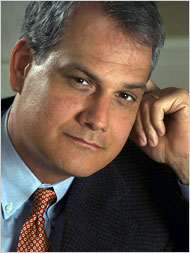 Correspondent: John Updike. He wrote a piece called
Correspondent: John Updike. He wrote a piece called 

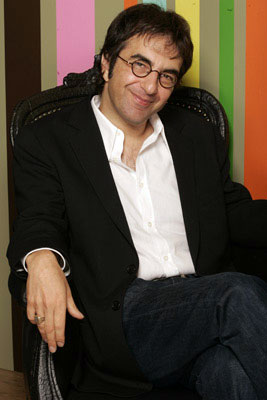 Correspondent: I had a rather funny question. But it’s one concerning your films that I have been obsessed with for some time. And I was pleasantly surprised to see the motif crop up again in Adoration. And that is your propensity to have shots set in airports or custom lines. We have them in the beginning of Exotica. We have them in Ararat with Christopher Plummer.
Correspondent: I had a rather funny question. But it’s one concerning your films that I have been obsessed with for some time. And I was pleasantly surprised to see the motif crop up again in Adoration. And that is your propensity to have shots set in airports or custom lines. We have them in the beginning of Exotica. We have them in Ararat with Christopher Plummer.

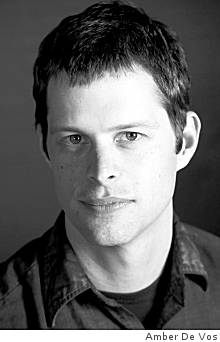 Correspondent: You have Emily and Lowboy entering at the 14th Street station. I’m going to get subway geeky with you here.
Correspondent: You have Emily and Lowboy entering at the 14th Street station. I’m going to get subway geeky with you here.

 Correspondent: You have, of course, Callie-ope — Calliope — and Cassandra. I read Janet Maslin’s review in the New York Times and she seemed to be really hung up on the notion that this represented some Greek mythology. But when I read your book, I immediately said to myself, “Oh! Well, this is a very funny red herring to throw the reader off.” Just as the dates that precede each particular section have no significant meaning, or very little meaning, on the narrative. And I’m wondering if little red herrings along these lines are intended to either see if the critics of the Janet Maslin streak are going to latch onto them or whether they represent a way for you to obtain this level of “just doing it” that you just described in your last answer.
Correspondent: You have, of course, Callie-ope — Calliope — and Cassandra. I read Janet Maslin’s review in the New York Times and she seemed to be really hung up on the notion that this represented some Greek mythology. But when I read your book, I immediately said to myself, “Oh! Well, this is a very funny red herring to throw the reader off.” Just as the dates that precede each particular section have no significant meaning, or very little meaning, on the narrative. And I’m wondering if little red herrings along these lines are intended to either see if the critics of the Janet Maslin streak are going to latch onto them or whether they represent a way for you to obtain this level of “just doing it” that you just described in your last answer.

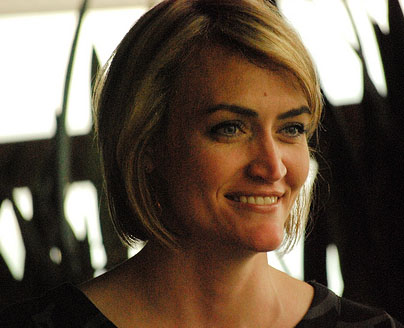


 Correspondent: You deem Alec Baldwin a celebutard partly because of the infamous voicemail to his daughter. But I’m wondering if it really is fair, given what you’ve just discussed in relation with Sean Penn and his political sentiments, to take something that was never intended for the public and put it up there with something that is actually in the public record. I mean, is it really fair to deem someone a celebutard for their private actions like this?
Correspondent: You deem Alec Baldwin a celebutard partly because of the infamous voicemail to his daughter. But I’m wondering if it really is fair, given what you’ve just discussed in relation with Sean Penn and his political sentiments, to take something that was never intended for the public and put it up there with something that is actually in the public record. I mean, is it really fair to deem someone a celebutard for their private actions like this?

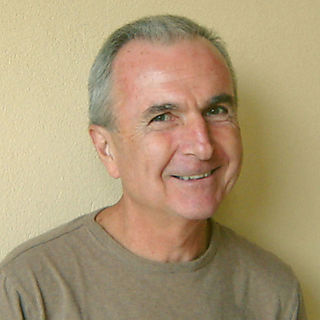 Correspondent: Has it ever occurred to you to try and make a big score in terms of writing a completely commercial book? In an effort to get people attached into the Peter Leroy universe? Or is such a thing absolutely impossible? Or did you, in fact, try to do this and it turned out to be so quirky and eccentric?
Correspondent: Has it ever occurred to you to try and make a big score in terms of writing a completely commercial book? In an effort to get people attached into the Peter Leroy universe? Or is such a thing absolutely impossible? Or did you, in fact, try to do this and it turned out to be so quirky and eccentric?



 Huston: Sometimes, if you use the same words, you can put a little tinkle of irony into it. In the fact that you describe him doing it exactly the way the person just told him. So you use the exact same words. It’s hard for me to answer questions about the writing that are that precise. Because so much of the process is not that precise for me. So much of it is shoveling. And you’re not too terribly conscious of how you shovel while you’re doing it. Whether you’re good at it or not.
Huston: Sometimes, if you use the same words, you can put a little tinkle of irony into it. In the fact that you describe him doing it exactly the way the person just told him. So you use the exact same words. It’s hard for me to answer questions about the writing that are that precise. Because so much of the process is not that precise for me. So much of it is shoveling. And you’re not too terribly conscious of how you shovel while you’re doing it. Whether you’re good at it or not. 

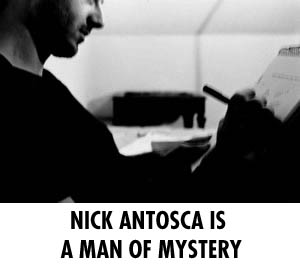


 Correspondent: Fariba’s birth certificate is fake, you note later on in the book.
Correspondent: Fariba’s birth certificate is fake, you note later on in the book. 

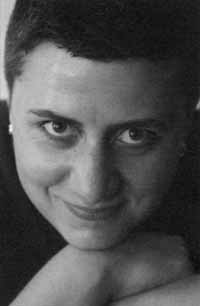 Correspondent: You quibble with the term “diagnosis.” You write, “There are no diagnoses in psychiatry. Only umbrella terms for observed patterns of complaint, groupings of symptoms given names, and oversimplified, and assigned what are probably erroneous causes because these erroneous causes can be medicated. And then both the drug and the supposed disease are made legitimate, and thus the profession as well as the patient legitimized, too, by those magical words going hand in hand to the insurance company ‘Diagnosis’ and ‘It’s not your fault.’” But if there are no diagnoses in psychiatry, well, where is the starting point? I mean, obviously, you have to start somewhere and identify a particular problem — even on a simplistic level — in order to help another person. So what of this?
Correspondent: You quibble with the term “diagnosis.” You write, “There are no diagnoses in psychiatry. Only umbrella terms for observed patterns of complaint, groupings of symptoms given names, and oversimplified, and assigned what are probably erroneous causes because these erroneous causes can be medicated. And then both the drug and the supposed disease are made legitimate, and thus the profession as well as the patient legitimized, too, by those magical words going hand in hand to the insurance company ‘Diagnosis’ and ‘It’s not your fault.’” But if there are no diagnoses in psychiatry, well, where is the starting point? I mean, obviously, you have to start somewhere and identify a particular problem — even on a simplistic level — in order to help another person. So what of this?

 Correspondent: What’s interesting too is that your career essentially started at the behest of very legendary people in the mystery world.
Correspondent: What’s interesting too is that your career essentially started at the behest of very legendary people in the mystery world.

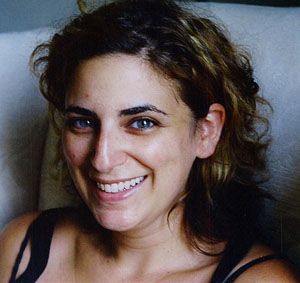 Correspondent: Golf figures prominently into a number of these stories. In “How Much Greater the Miracle,” you write, “The soul and golf are interrelated. I try not to wax too philosophical, but the soul is like a golf ball.” Now is this particular statement one of the reasons you frequently return to golf in your writing? Do you feel that golf gets a bad rap? Is this your way of essentially taking it, or absconding it, from the upper-class country club associations? Are you trying to counter the John Updike/Richard Ford/Kevin Costner kind of approach to golf? I think this is a very important question!
Correspondent: Golf figures prominently into a number of these stories. In “How Much Greater the Miracle,” you write, “The soul and golf are interrelated. I try not to wax too philosophical, but the soul is like a golf ball.” Now is this particular statement one of the reasons you frequently return to golf in your writing? Do you feel that golf gets a bad rap? Is this your way of essentially taking it, or absconding it, from the upper-class country club associations? Are you trying to counter the John Updike/Richard Ford/Kevin Costner kind of approach to golf? I think this is a very important question!

 Vigalondo: When you’re writing a script, sometimes the script is put into a nightmare. Sometimes, it’s giving you some gift. And in this case, when I was writing Timecrimes, I found a monster inside the story. But the story itself gave me the monster. I needed someone with a hidden face, with a scissors on the hand. So I found out that the story was building a monster. A monster that had these classical resonances, as you are telling. So I feel so fortunate. Because when you have a monster in your movie, the movie gets better most of the time. Every movie with a monster is better than the same story without the monster. You can apply this to all the other — to every example. I don’t know. If Million Dollar Baby had a monster, it would be a better film.
Vigalondo: When you’re writing a script, sometimes the script is put into a nightmare. Sometimes, it’s giving you some gift. And in this case, when I was writing Timecrimes, I found a monster inside the story. But the story itself gave me the monster. I needed someone with a hidden face, with a scissors on the hand. So I found out that the story was building a monster. A monster that had these classical resonances, as you are telling. So I feel so fortunate. Because when you have a monster in your movie, the movie gets better most of the time. Every movie with a monster is better than the same story without the monster. You can apply this to all the other — to every example. I don’t know. If Million Dollar Baby had a monster, it would be a better film. 

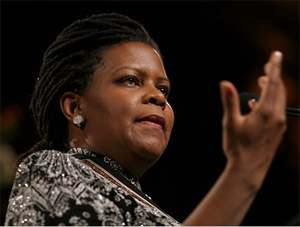 Correspondent: How are you wrestling with Whitman exactly?
Correspondent: How are you wrestling with Whitman exactly?

 Correspondent: So you actually added 10,000 words just in the editing process?
Correspondent: So you actually added 10,000 words just in the editing process?

 Correspondent: Going back to the idea of the general reader, or the common reader — whatever we want to call the audience here — the philosophical proposition involving the fly, the bat, and the worm expressing basic cognitive abilities, and how cognitive abilities come together so that humans are a higher form of animal than other animals, this was a very clear way of expressing this particular concept of individual senses. And I’m wondering if this was something that you concocted. Or that you took from Kant. Because I actually tried to find a philosophical precedent for this as well.
Correspondent: Going back to the idea of the general reader, or the common reader — whatever we want to call the audience here — the philosophical proposition involving the fly, the bat, and the worm expressing basic cognitive abilities, and how cognitive abilities come together so that humans are a higher form of animal than other animals, this was a very clear way of expressing this particular concept of individual senses. And I’m wondering if this was something that you concocted. Or that you took from Kant. Because I actually tried to find a philosophical precedent for this as well.

 Correspondent: I wanted to ask you about the tale of the prodigal son, which of course comes from Luke 15:11. The onus of guilt in that parable, however, falls largely on the son. Specifically, the quote is “Father I have sinned against heaven, and before thee / And am no more worthy to be called they son; make me as one of thy hired servants.” But Jack, he calls his father “Sir.” Not “Dad.” Although there’s a slight discrepancy near the end. He works on the DeSoto of his own accord. He’s often summoned to play on the piano and the like, and also work in the garden. But he’s sometimes an unapologetic sinner. And other times, he drowns his sorrows in alcohol. So the interesting question here about the prodigal son is: The framework of the Scriptures is clearly there in this book, but I’m curious as to when you decided to launch away from that. Likewise, was this actually a starting point? Or was it an intuitive process of trying to obvert what we know about that particular story from Luke?
Correspondent: I wanted to ask you about the tale of the prodigal son, which of course comes from Luke 15:11. The onus of guilt in that parable, however, falls largely on the son. Specifically, the quote is “Father I have sinned against heaven, and before thee / And am no more worthy to be called they son; make me as one of thy hired servants.” But Jack, he calls his father “Sir.” Not “Dad.” Although there’s a slight discrepancy near the end. He works on the DeSoto of his own accord. He’s often summoned to play on the piano and the like, and also work in the garden. But he’s sometimes an unapologetic sinner. And other times, he drowns his sorrows in alcohol. So the interesting question here about the prodigal son is: The framework of the Scriptures is clearly there in this book, but I’m curious as to when you decided to launch away from that. Likewise, was this actually a starting point? Or was it an intuitive process of trying to obvert what we know about that particular story from Luke?

 Correspondent: Going back to Wings, I actually wanted to talk about “Crying in Berlin.” This song, out of all the songs that I’ve listened to of yours, sounds the most like a James Bond song. And I do know the Hindustan Times reported in 2006 that the only thing that could bring you out of retirement was recording a James Bond theme of some sort. I’m wondering if you’ve considered approaching the Bond producers to sing a song just as you called up and contacted [Jim] Steinman, and said, “Hey, I want you to go ahead and produce this particular album.”
Correspondent: Going back to Wings, I actually wanted to talk about “Crying in Berlin.” This song, out of all the songs that I’ve listened to of yours, sounds the most like a James Bond song. And I do know the Hindustan Times reported in 2006 that the only thing that could bring you out of retirement was recording a James Bond theme of some sort. I’m wondering if you’ve considered approaching the Bond producers to sing a song just as you called up and contacted [Jim] Steinman, and said, “Hey, I want you to go ahead and produce this particular album.”

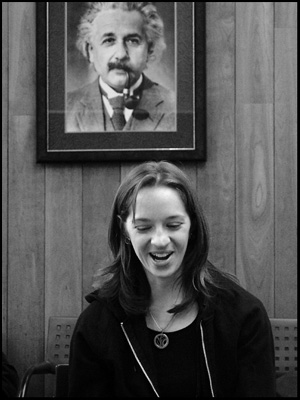 Correspondent: You’ve actually dined on squab. You allude to the fact that it’s delicious, that it’s dark meat. But as a carnivore and somewhat of a curio, I had to ask whether it tasted like chicken or like duck or like turkey. I mean, you didn’t go into specifics here. And I’m wondering if the experience was possibly unsettling or you couldn’t convince yourself completely that it was delicious. Because you also sympathized with these birds. But what of this?
Correspondent: You’ve actually dined on squab. You allude to the fact that it’s delicious, that it’s dark meat. But as a carnivore and somewhat of a curio, I had to ask whether it tasted like chicken or like duck or like turkey. I mean, you didn’t go into specifics here. And I’m wondering if the experience was possibly unsettling or you couldn’t convince yourself completely that it was delicious. Because you also sympathized with these birds. But what of this?

 Correspondent: I should observe that you grew up in Houston.
Correspondent: I should observe that you grew up in Houston.